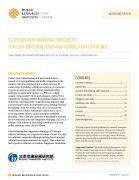Study on international practices for low emission zone and congestion charging
Study on international practices for low emission zone and congestion charging

The traffic congestion and its high socioeconomic cost, brought by China’s fast urbanization, has forced the demand for congestion mitigation and emission reduction in the transport sector onto the government’s agenda. Several Chinese cities like Beijing, Shanghai, Hangzhou and Suzhou are considering to mitigate these growing air pollution and traffic congestion issues through Low Emission Zone (LEZ) and Congestion Charging (CC) policies. Based on the policy demands from Beijing Municipal Commission of Transport (BMCT), World Resources Institute (WRI), partnering with Beijing Transportation Institute (BTI), has conducted a comprehensive and thorough research on the successful experience of London, Singapore and Stockholm that have initiated LEZ/CC, with analysis focusing on preparation stage, scheme design, technology, public communication, implementation and management, and policy effects. This working paper discusses practices that can be applied to China, aiming to solve problems and challenges in the effort of congestion mitigation and emission reduction.







